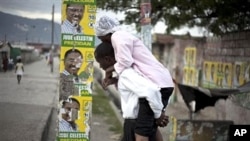Haitian voters go to the polls on Sunday to choose a new president and elect a 99-member lower house and 11 members of the 30-seat Senate. The election is going forward despite the cholera epidemic now plaguing the nation and the lingering effects from the earthquake that devastated the country last January.
With the country still digging out from the earthquake, and in the midst of a deadly cholera epidemic, the election season has come to Haiti. This election is billed as one of the most important in decades. International donors are waiting to grant billions in aid money to a new government. The streets are full of campaigners and fanfare. Mathieu Tranquilor is one of almost 20 candidates running for a senate seat in Port-au-Prince.
"The election is very important to me because we have 18,000 people living under tents. And with the help of the international community through different programs and our party we are going to get the country going like it should," Tranquilor said.
That is the question on most Haitians' minds: will the poorest country in the Western hemisphere, known for rampant corruption and squandering international aid, finally get the political leadership that will bring real change?
Anticipation is high. Government offices are overwhelmed by people seeking national identity cards necessary to vote.
Fritcat Monllaiser says he has tried for two days to get an identity card.
"What I want is change. I want somebody that I can trust to help us," he said.
Noel Jaenes told us even though he thinks the political process is corrupt and the election rigged, he will vote.
"Yes, because I want changes in the country," said Jaenes. "The country cannot stay the way it is. And, we have to come out en masse."
Some Haitians want the election to be postponed because of the cholera outbreak and earthquake damage. But Tranquilor will hear none of that.
"As far as the election is concerned, we need to have an election. Because constitutionally, on February 7, the current government will be dissolved. So we need to have an election with the help of the international community," Tranquilor said.
Haiti's recent crises have brought new minds into the political process. Haitian-born Russel Lacroix is Tranquilor's campaign manager. He is a civil engineer from Queens, New York, who has lived in the U.S. for the past 16 years. He came down two weeks ago to help his old school mate run for office. He plans to stay and run for president himself in five years, the period of residence required by law.
"You have to understand, I was born in Haiti. I am 100 percent Haitian. When I saw everything from the TV, I have to come to my country to see on my own with my own eyes," Lacroix said. "And to see how I can help my country and rebuild my country with the help of the international community. And that is the main reason why I am here."
The United States has pledged $14 million in election aid to help fund a team of international observers and other logistical needs.
Some officials worry that if turnout is less than 40 percent, the election could be declared illegitimate.
With so many candidates running in multiple races, no one expects clear winners on Sunday, setting up a runoff.




